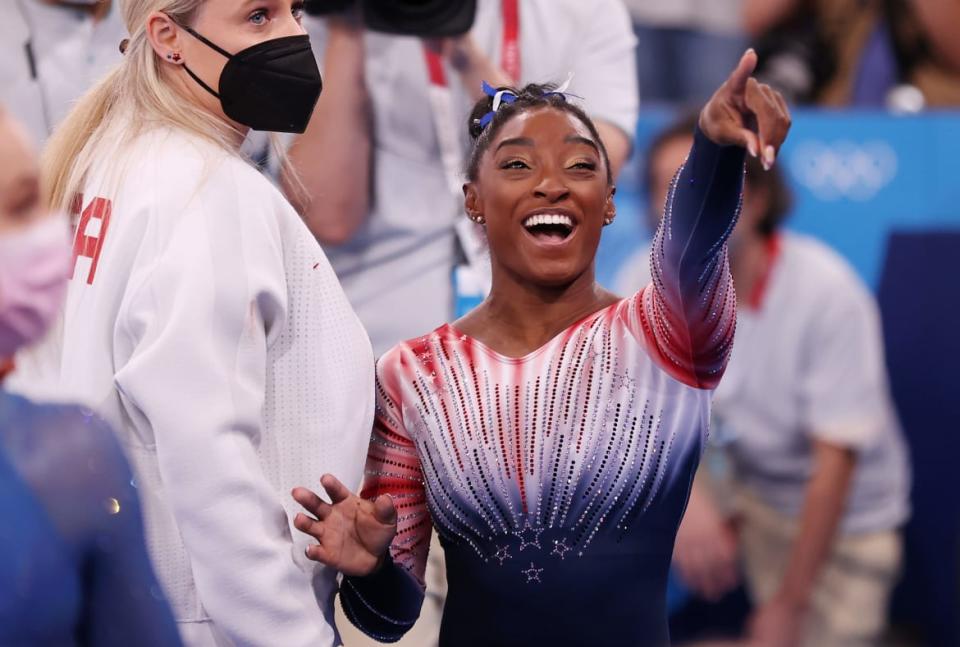COVID-19, the Bear, and Simone, Oh My: The Wildest Moments of the Weirdest Olympics in History

- Oops!Something went wrong.Please try again later.
The 2020 Tokyo Olympics were a weird time.
For starters, the Games, which end on Sunday, were held in 2021 yet were still called the 2020 Olympics. The opening ceremony’s composer quit after admitting he forced a disabled boy to eat poop. We had to endure the second-worst rendition of John Lennon’s Imagine. Lady Gaga was even supposed to remotely launch out of a cannon at one point, according to a report. It was truly a weird time.
Here are some of the best—and weirdest—moments from an Olympics to remember, regardless of whether we want to.
The Officially-Unofficial Russian Team
No one could say Russia competed in this year’s Olympics, for legal reasons. In 2019, Russia was banned from international sports through 2022 for running a state-sponsored doping program. That meant the country couldn’t fly its flag, play its anthem, or have its athletes compete under the country’s name. Athletes got around that by playing under the Russian Olympic Committee, and those not part of the doping scandal could compete as part of a neutral delegation. Its markings still bore the Russian flag colors, and the Olympic housing quarters displayed the colors, but it was officially not Russia. The not-the-country country did well, too, placing fourth among Olympic medals.
Suni Lee’s Standing Ovation 6,000 Miles Away

While the Olympics did not allow spectators, that didn’t stop families from tuning in from home. But few could compare to the family of 18-year-old Sunisa Lee, the Olympic gymnast who unexpectedly won gold in the women’s individual all-around. Lee became the first Hmong American to compete at the Olympics, with her family watching from St. Paul, Minnesota. It became an even bigger milestone for Lee, whose father was paralyzed in 2019. She considered dropping out to care for him, according to People, but he urged her to soldier on. Their support, though from afar, seemed to help her—and them—strike gold.
She did it. @sunisalee_ is the queen of the women’s gymnastics all-around finals and her parents. OMG. Tears every where. 🥺 #Gold #TokyoOlympics #hmong pic.twitter.com/n2xM7VJOPq
— Gia Vang (@Gia_Vang) July 29, 2021
The Never-Ending Adventures of COVID-19
It’s important to remember why Lee and everyone else’s family couldn’t be in attendance: a global pandemic. Despite widespread opposition from the Japanese public and its leaders, the Games went ahead amid a COVID surge in the largely unvaccinated country. Athletes were forced to remain on Olympic grounds throughout the entirety of the Games, prohibited from seeing the city—or other teams. In total, 404 people contracted the virus at the Olympics as of Saturday, according to organizers, including 29 athletes, but Brian McCloskey, one of the event’s COVID advisers, declared on Saturday that the Games were “safe and secure.”
Tokyo saw its highest case count since the pandemic began on Thursday. But all in the name of sports.
Tom Daley Knits a Cardigan
Some athletes did manage to make the most of the situation. British diver Tom Daley, already famous for his diving prowess, became an online sensation after he was spotted knitting on the sidelines of Olympic events. He posted a number of his creations on his second Instagram account, @madewithlovebytomdaley, including a “Team GB” cardigan and a pouch for his synchronized diving gold medal. He finished his Olympic run Saturday with a bronze medal, becoming the first British diver with four Olympic medals.
A Belarus Sprinter Forced to Defect to Poland
Not all Olympians had as easy of a time. Belarus sprinter Krystsina Tsimanouskaya, 24, defected to Poland after she was told she’d have to immediately return to the country for criticizing her team’s coaches. She described in harrowing detail how she was forced to use Google Translate to escape Belarusian officials at the airport in Japan, eventually landing at the Polish embassy and, on Wednesday, in Poland itself. Athletes have frequently tried to escape the Games in order to escape the countries they represent. Ugandan lifter Julius Ssekitoleko, 20, disappeared in Japan at the start of the Games to escape his country before eventually returning to Uganda days later

Smaller Countries Shine Big–and Win Gold
Some smaller countries not generally noticed also got their dues. San Marino became the smallest country in history to win an Olympic medal after trap shooter Alessandra Perilli, 33, won bronze in the women’s trap. The enclave country off the coast of Italy is home to only 34,000 people but Perilli’s win put her and her home on the map. “We are a small country but very proud,” Perilli said. “They are for sure going crazy, crying.” Other countries also got to win big. The Philippines and India also both won their first Olympic gold medal ever.
The Running of the Bear
It wasn’t just humans that got to have fun at the Games. An Asian black bear was spotted roaming around an Olympic baseball stadium hours before the first women’s softball game, forcing officials to blast loud music and firecrackers to try and draw it out. It led to a flurry of discussions over how the bear got in, what could be done to contain it, and if there were more. Officials never disclosed if the bear was captured but regardless, it showed that the Olympics weren’t completely spectator-free.
Novak’s Natural Meltdown
Tennis star Novak Djokovic managed to end his Olympic turn in a similar fashion to some of his other tournaments: a strike out, scream, and pout. The Serbian player left the Games with no medals after losing the third-place singles match, breaking two tennis rackets in the process and eventually withdrawing from the mixed doubles game. He pointed to his own mental and physical exhaustion as the culprit, along with Tokyo’s massive heat, but even still, it was a classic Djokovic exit. It remains to be seen how he will shape up for his next match: the U.S. Open, scheduled to begin on Aug. 30.

Djokovic smashes his racket during his bronze medal match.
The Hottest Olympics in History
Even Djokovic made a fair point with the heat. The Olympics were regarded by some meteorologists as the hottest on record, with athletes breaking down under tortuous conditions. Temperatures reached as high as 93 degrees with humidity levels around 62 percent, leading to it feeling like 109 degrees. Russian tennis player Daniil Medvedev got so hot during his match that he asked the umpire who would be responsible if he died. The very end of the Games may bring some relief, though—a tropical storm is set to hit Japan over the weekend, bringing some cooler, if not necessarily pleasant, weather.

Daniil Medvedev takes a medical timeout.
Simone and Naomi Become the New Underdogs
A year ago, all-stars Simone Biles and Naomi Osaka were at the top of the world, but as they went into this year’s Olympics, the two were forced to prove their status as such. Osaka had spent months away from the sport after withdrawing from the French Open for mental health issues. She eventually returned at the Olympics to light the torch during the Opening Ceremony, competing in two matches before a final third-place loss. While she didn’t win a medal, Osaka made her mark on her own terms.
As did Biles. After a disappointing showing during her first vault, Biles withdrew from multiple Olympic events due to mental pressure. It led to frenzied speculation over whether she would compete in any other Olympic events, with Biles taking to Instagram to explain how her “mind and body are simply not in sync." She eventually returned—on her own terms, after days of private practice at a Japanese gym—to win bronze on the balance beam, telling reporters afterward, “I wasn't expecting to walk away with the medal. I was just going out there doing this for me."
The 2020 Olympic Games may be over, but moments like these are likely to transcend the Games until the next Summer Olympics. Here’s to 2024—or next year, when the Winter Olympics wreak havoc on us all.

Get our top stories in your inbox every day. Sign up now!
Daily Beast Membership: Beast Inside goes deeper on the stories that matter to you. Learn more.

